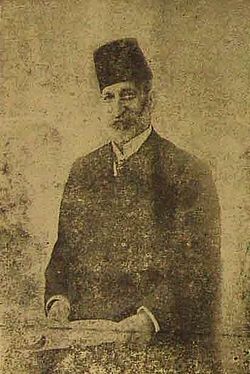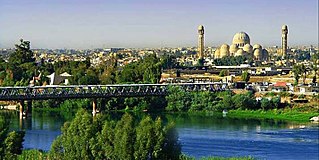
Mosul is a major city in northern Iraq,serving as the capital of Nineveh Governorate. The city is considered the second largest city in Iraq in terms of population and area after the capital Baghdad,with a population of over 3.7 million. Mosul is approximately 400 km (250 mi) north of Baghdad on the Tigris river. The Mosul metropolitan area has grown from the old city on the western side to encompass substantial areas on both the "Left Bank" and the "Right Bank",as locals call the two riverbanks. Mosul encloses the ruins of the ancient Assyrian city of Nineveh –once the largest city in the world –on its east side.

Farhud was the pogrom or the "violent dispossession" that was carried out against the Jewish population of Baghdad,Iraq,on 1–2 June 1941,immediately following the British victory in the Anglo-Iraqi War. The riots occurred in a power vacuum that followed the collapse of the pro-Nazi government of Rashid Ali while the city was in a state of instability. The violence came immediately after the rapid defeat of Rashid Ali by British forces,whose earlier coup had generated a short period of national euphoria,and was fueled by allegations that Iraqi Jews had aided the British. More than 180 Jews were killed and 1,000 injured,although some non-Jewish rioters were also killed in the attempt to quell the violence. Looting of Jewish property took place and 900 Jewish homes were destroyed.

The former communities of Jewish migrants and their descendants from Baghdad and elsewhere in the Middle East are traditionally called Baghdadi Jews or Iraqi Jews. They settled primarily in the ports and along the trade routes around the Indian Ocean and the South China Sea.

The history of the Jews in Iraq is documented from the time of the Babylonian captivity c. 586 BCE. Iraqi Jews constitute one of the world's oldest and most historically significant Jewish communities.

Elie Kedourie was a British historian of the Middle East. He wrote from a liberal perspective,dissenting from many points of view taken as orthodox in the field. From 1953 to 1990,he taught at the London School of Economics,where he became Professor of Politics. Kedourie was famous for his rejection of what he called the "Chatham House version" of history,which viewed the story of the modern Middle East as one of continuous victimisation at the hands of the West,and instead castigated left-wing Western intellectuals for what he regarded as a naively romantic view of Islam.
The rise of the Western notion of nationalism in the Ottoman Empire eventually caused the breakdown of the Ottoman millet system. The concept of nationhood,which was different from the preceding religious community concept of the millet system,was a key factor in the decline of the Ottoman Empire.

Saleh (1908–1986) and Daud (1910–1976) Al-Kuwaity were Kuwait-born Israeli musicians of Iraqi-Iranian ancestry who rose to prominence in the Arab world in the early twentieth century. The brothers had a pioneering role in the modern classical music of Iraq and Kuwait,especially the Iraqi maqam and Kuwaiti sawt genres. In 1951,the brothers immigrated from Iraq to Israel.
Baghdad Jewish Arabic or autonymhaki mal yihud or el-haki malna is the Arabic dialect spoken by the Jews of Baghdad and other towns of Southern Iraq. This dialect differs from the dialect spoken by the Jews in Northern Iraq,such as Mosul and 'Ana. The Baghdadi and Northern dialects may be regarded as subvarieties of Judeo-Iraqi Arabic. As with most Judeo-Arabic communities,there are likely to be few,if any,speakers of the Judeo-Iraqi Arabic dialects who still reside within Iraq. Rather these dialects have been maintained or are facing critical endangerment within respective Judeo-Iraqi diasporas,namely those of Israel and the United States. In 2014,the film Farewell Baghdad,which is performed mostly in Jewish Baghdadi Arabic dialect,became the first film to be almost completely performed in Judeo-Iraqi Arabic.
David Alroy or Alrui,also known as Ibn ar-Ruhi and David El-David,was a Jewish Messiah claimant born in Amadiya,Iraq under the name Menaḥem ben Solomon. David Alroy studied Torah and Talmud under Hasdai the Exilarch,and Ali,the head of the Academy in Baghdad. He was also well-versed in Muslim literature and known as a worker of magic.
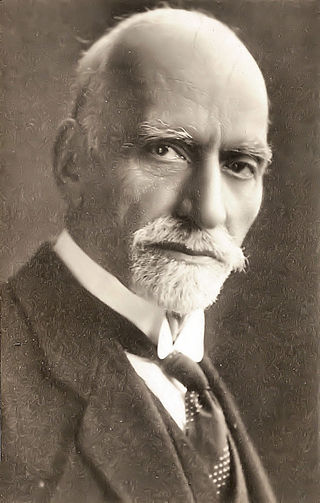
Sassoon Eskell,KBE was an Iraqi statesman,financier and politician. Also known as Sassoon Effendi,he was regarded in Iraq as the Father of Parliament. Eskell was the first Minister of Finance in the Kingdom and a permanent Member of Parliament until his death. Along with Gertrude Bell and T. E. Lawrence,he was instrumental in the creation and the establishment of the Kingdom of Iraq post Ottoman rule,and he founded the nascent Iraqi government's laws and financial structure.
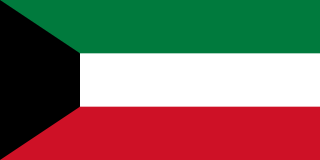
The history of the Jews in Kuwait is closely connected to the history of the Jews in Iraq.
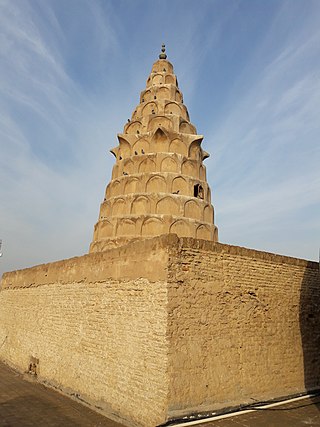
Ezekiel's Tomb,located in Al Kifl,Iraq,is believed by Jews and Muslims to be the tomb of the biblical prophet Ezekiel. Today it forms part of the Al-Nukhailah Mosque complex. For religious Jews,it is the oldest and most important Jewish religious site in Iraq.
The Al-Muthanna Club was an influential pan-Arab fascist society established in Baghdad ca. 1935 to 1937 which remained active until May 1941,when the coup d'état of pro-Nazi Rashid Ali al-Gaylani failed. It was named after Al-Muthanna ibn Haritha,an Iraqi Muslim Arab general who led forces that helped to defeat the Persian Sassanids at the Battle of al-Qādisiyyah. Later known as the National Democratic Party,Nadi al-Muthanna was influenced by European fascism and controlled by radical Arab nationalists who,according to 2005's Memories of State,"formed the core of new radicals" for a combined Pan-Arab civilian and military coalition.

Baghdad Eyalet was an Iraqi eyalet of the Ottoman Empire centered on Baghdad. Its reported area in the 19th century was 62,208 square miles (161,120 km2).

By the time the Ottoman Empire rose to power in the 14th and 15th centuries,there had been Jewish communities established throughout the region. The Ottoman Empire lasted from the early 14th century until the end of World War I and covered parts of Southeastern Europe,Anatolia,and much of the Middle East. The experience of Jews in the Ottoman Empire is particularly significant because the region "provided a principal place of refuge for Jews driven out of Western Europe by massacres and persecution."
Events in the year 1932 in the Kingdom of Iraq.
The town of Qal'at Saleh is the district centre of Qal'at Saleh District,Maysan Governorate,southern Iraq. It is located along the road that links Basra to Amarah,a mere 40 km away. Qalat Saleh’s nearest towns are the district centres of Al-Majar Al Kabeer,Al Kahlaa,and Al Azeer. The town is surrounded by agricultural villages and rural communities:Sulaymaniyah village,Abu Samih village,and Beit Khaled village.
The Senate of Iraq was the unelected upper house of the bicameral parliament established by the Mandatory Iraq's 1925 constitution. There were around twenty Senators,appointed for eight years by the King of Iraq. The Senate remained in existence until the 1958 revolution.
Solomon Ma'tuk, or Sulayman ben David Ma'tuk or Matuq was a communal leader,astronomer and Jewish devotional poet of Baghdad,whose piyyutim are still incorporated in Iraqi Jewish liturgy.
Ezekiel Judah, or Yehezkel Yehuda or Yahuda or Ezekiel Judah Jacob Sliman was a Jewish communal leader,indigo,muslin and silk trader,philanthropist and talmudist of Baghdad,who migrated to India,leading the Baghdadi Jewish community of Kolkata in his lifetime and establishing the city's first synagogues.
